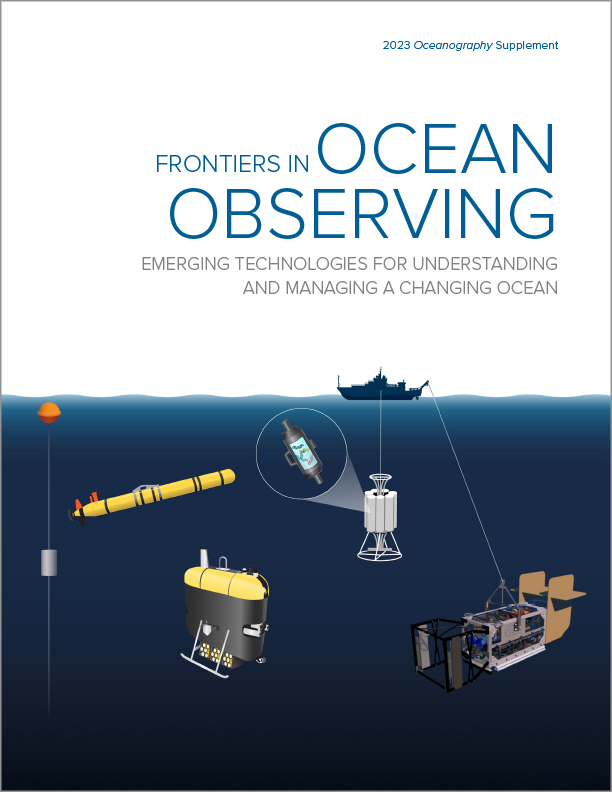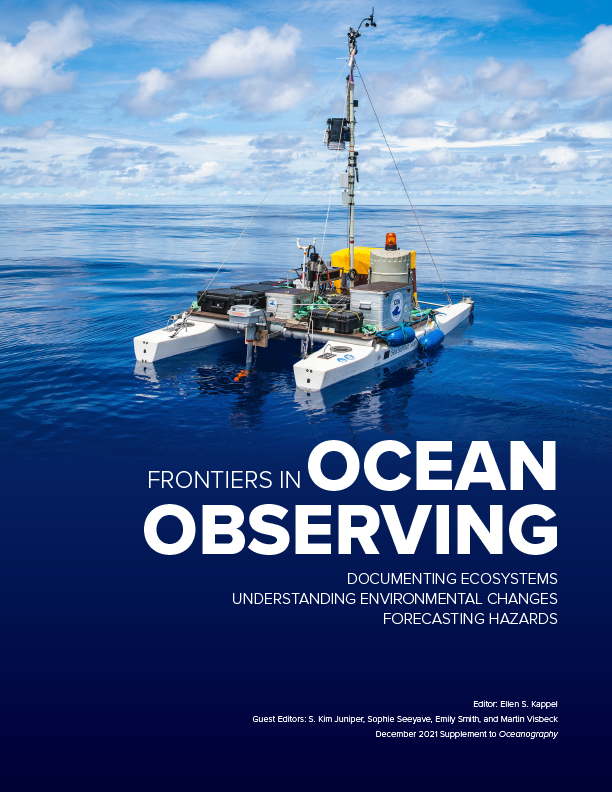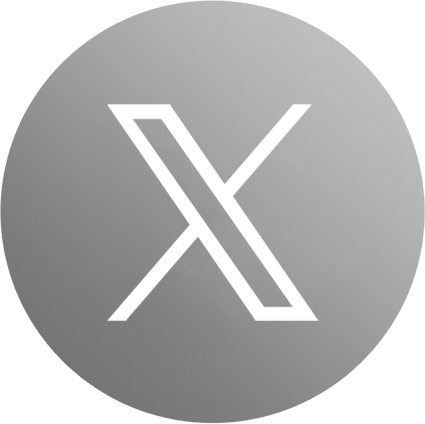OCEANOGRAPHY SUPPLEMENT
Frontiers in Ocean Observing
Invitation to Contribute Articles
In December 2024, The Oceanography Society plans to publish its third supplement to Oceanography magazine on “Frontiers in Ocean Observing.” As the executive committee for this publication, we are seeking initial interest in contributing short articles to this booklet.
Letters of interest should be emailed to Oceanography Editor Ellen Kappel ([email protected]) by March 15, 2024, and should contain the following:
- A summary of the content of the proposed paper (no more than 200 words)
- Potential authorship and affiliations
- Identify which theme your article would fit under (see below)
- Contact information
Notice of whether you will be invited to contribute an article will be sent by April 15, 2024. Further information on deadlines are provided at the end of this invitation.
PURPOSE
The purpose of the supplement is to widely disseminate information about the many different ways in which scientists observe the ocean to improve our understanding and support the sustainable management of the ocean and its resources. In a series of short articles that include high-quality scientific graphics and photos to bring topics alive for readership, the supplement will make ocean observing technologies, fieldwork, scientific results, and their societal relevance accessible to a broad audience. One of the aims of the supplement is to help explain the scientific and societal importance of ocean observing to funders, policymakers, and the general public.
DISTRIBUTION
As an open-access journal, a full PDF of the ocean observing supplement, as well as individual contributions, will be openly available to the public on the Oceanography website at the time of publication. A digital flipbook will also be available on the Oceanography kiosk. The first and second supplements are available here.
COSTS
There is no cost to authors for publishing in this professional, high-quality supplement. Copy editing, design, and web distribution will be covered by sponsors, including Ocean Networks Canada (ONC), the Partnership for Observation of the Global Ocean (POGO), and the National Oceanic and Atmospheric Administration’s Global Ocean Monitoring and Observing Program (NOAA/GOMO).
FORMAT
Most articles will be approximately 1,200 words and include one simple scientific figure or location map and one or two high-quality photos. The flipbook versions of articles can include video, animations, audio files, and photo galleries associated with figures; we strongly encourage authors to take advantage of these options to enhance your articles. Invited guest editors for the individual themes will review all letters of interest along with the executive committee, after which invitations will be sent to authors.
THEMES
For the 2024 supplement, we continue to align the themes with the priorities of the UN Decade of Ocean Science for Sustainable Development and are seeking contributions within the following five areas:
THEME 1: Model-Based Design and Evaluation of Observing Networks
GUEST EDITORS: John Wilkin (Rutgers University), Patrick Heimbach (University of Texas at Austin), and Helen Pillar (University of Texas at Austin)
Data-assimilating ocean simulation models are now widely used to produce skillful analyses and predictions of the ocean state at regional to global scales. Systematic numerical experiments with models, and advanced applications of data assimilation theory, offer ways to formally evaluate the impact that particular observations or networks have on state estimates and forecast skill. This theme seeks submissions that describe and apply model-based methods for methodically evaluating existing integrated ocean observing systems and future extensions by exploring process-focused array design, observation priorities, and sampling strategies; complementarity versus redundancy of multi-platform networks; and detectable change in key climate metrics.
THEME 2: The Use of Autonomous Tools for Ecosystem Management and Monitoring of Marine Protected Areas
GUEST EDITORS: Catherine Edwards (Skidaway Institute of Oceanography, University of Georgia) and Georgia Coward (Center for Ocean Leadership, UCAR)
Over the past 20 years, autonomous vehicles for data acquisition and transport (including gliders, drifters, autonomous surface vehicles, drop-cams, moorings, and cabled systems) have progressed from experimental to operational. As such, they have become standard research tools in the ocean observation toolkit, equipped with sensors to monitor temperature, salinity, currents, oxygen, and bio-optical parameters, among other essential ocean variables. Worldwide, their collected data have been used to aid in environmental hazard detection, hurricane prediction, tracking of oceanic features (e.g., upwelling and other essential ocean features), and understanding physical oceanographic conditions. More recently, the utility, potential, and capacity of autonomous vehicles in obtaining biological data have grown and matured to enable their operational use to aid in ecosystem-level management and monitoring the state of marine protected areas (MPAs). Their ability for economically feasible long deployments—particularly in challenging geographical areas—and relatively quiet modes of operation make them ideal platforms to survey marine organisms, from whales to zooplankton. We seek articles that demonstrate how sensors on autonomous vehicles are filling critical gaps in ocean biological and spatial conservation knowledge that will help tackle ecosystem-level challenges caused by global environmental changes.
THEME 3: Western Boundary Currents and Their Impacts on Shelf Seas
GUEST EDITORS: Moninya Roughan (UNSW Sydney, Australia), Tammy Morris (SAEON, South Africa), and Ilson Carlos A. da Silveira (University of São Paulo, Brazil)
Western Boundary Currents (WBCs) are the heat engines of our major oceans, transporting large volumes of water from the tropics to more temperate regions. They are key to the transport of mass, heat, salt, biogeochemical properties, and plankton. WBCs have huge societal impact, interacting with subtropical continental margins adjacent to highly populated coastlines, influencing the physics and the biology of the shelf seas. They are also regions of strong cross-shelf exchange with potential for carbon export. WBCs are known ocean warming hotspots, with their extension regions warming at rates far above the global average, and the adjacent shelf seas also rapidly warming. Quantifying baselines, environmental change, and marine extremes in WBCs as well as their coastal impacts requires long-term multi-platform observations of temperature, freshwater fluxes, biogeochemistry, and other variables. However, sustained observing in these highly dynamic regions is a challenge due to strong and highly variable ocean currents and the large spatial scales. Successful observing strategies may include international cooperation and deep engagement with regional user groups to respond to the needs and challenges of local communities and stakeholders. We seek articles that will showcase long-term, sustained observational efforts in WBC shelf sea regions that highlight strengths, weaknesses, and gaps in the system (particularly those outlining the cross-platform use of ocean observing systems to monitor less-studied boundary currents), and/or examples of end user and stakeholder engagement.
THEME 4: Robot-Enabled Access to the Deep Sea
GUEST EDITORS: Eric Terrill and Sophia Merrifield (both at Scripps Institution of Oceanography) and Eric Gallimore (Woods Hole Oceanographic Institution)
Recent advancements in sensor technologies, including optical, acoustic and chemical sensors, have significantly enhanced the capabilities of underwater robots to sample the seabed. These sensors allow for precise data collection in the challenging deep-sea environment, enabling scientists to study marine life, geology, archeology, pollution impacts, and physics in greater detail. The integration of machine learning image processing and AI-driven route planning will further augment the utility of these robots by enabling both in-stride autonomous decision-making and speeding the synthesis of large data sets. Papers submitted to this section will provide recent examples of how the intersection between cutting-edge sensors, data analytics, and robotics are advancing deep-sea exploration and opening avenues for discoveries and a deeper understanding of our planet’s least-explored realms.
THEME 5: Low-Cost Technology for an Accessible Deep Ocean
GUEST EDITORS: Jessica A. Sandoval and Katherine L.C. Bell (both at the Ocean Discovery League)
Financial, technical, and logistical barriers severely limit access to the deep sea. Low-cost, deep-diving technological solutions can substantially broaden participation in ocean research and exploration. Broadening deep-sea exploration and research creates more equitable and accessible ocean stewardship while also improving the observation, exploration, and management of deep-sea environments that are both critical and vastly underexplored. One solution to this growing need is the development of low-cost ocean instrumentation. Within recent years, there has been a dramatic rise in both interest and work in this emerging field. Within this topic area, we seek to highlight the impacts and advances in the space of low-cost, deep-ocean sensing and demonstrate the breadth and depth of this nascent field. We seek articles that will showcase (1) existing low-cost deep-ocean technology (i.e., sensors, vehicles) that have been successfully demonstrated in the field, and (2) low-cost deployment/recovery alternatives to enable deep-ocean research.
DEADLINES
- Expression of interest: March 15, 2024
- Confirmation of contribution: April 15, 2024
- First draft: July 31, 2024
- Expected publication date: December 2024
We look forward to hearing from you!
The Ocean Observing Executive Committee
Ellen Kappel (Oceanography magazine), Benoît Pirenne (ONC), Sophie Seeyave (POGO), Ann-Christine Zinkann (NOAA/GOMO), and Martin Visbeck (GEOMAR)
QUESTIONS?
If you have questions about this supplement, please contact Oceanography editor Ellen Kappel ([email protected]).

© 2026 The Oceanography Society
1 Research Court, Suite 450-117, Rockville, MD, 20850, USA | Phone: (1) 301-251-7708 | [email protected] | Privacy Policy






